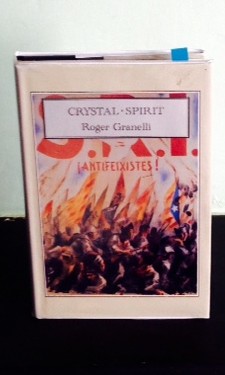Inspiring Older Readers
 posted on 02 Aug 2015
posted on 02 Aug 2015
Crystal Spirit by Roger Granelli
It’s not really surprising to find that a novel about International Brigade volunteers in the Spanish Civil War is haunted by ghosts. But it isn’t just the ghosts of the combatants that stalk the pages of Granelli’s book – the shades of the authors who have influenced this work can also be caught in the corners of your eye at almost every turn. Here’s a bit of H.G.Wells; over there, D.H.Lawrence; turn a page and there is George Orwell; Ernest Hemmingway pops in to colour the action. I have a lot of sympathy with the author because it must be almost impossible to write a novel about the subject he has chosen which doesn’t consciously or unconsciously draw on these past masters but their presence does force on you some unfavourable comparisons.
The book tells the story of David Hicks, saved from going down the pit in the Welsh Valleys by his parents’ determination to give him an education and their insistence that he should ‘better’ himself. He develops into a self-centred and unsympathetic young man who seeks to use people for his advantage. He takes what he thinks will be a short term opportunity in the local big store only to become infatuated with the owners daughter. When he gets her pregnant he finds he is suddenly trapped – and he responds with petulance coming to despise his good natured new wife and his bourgeois shop-keeper identity. The baby is still born and David, alienated from his wife, slowly gets drawn into the politics of the day by his charismatic Uncle Billy – a fellow traveller with the CPGB and a militant trade unionist.
Billy ends up enlisting for duty with the Republicans and disappears to Spain. Eventually David and his closest friend, Tom, decide they too must take action and set off to find out for themselves what the situation in Spain is actually like. David survives but Billy and Tom do not and as a result of his experiences he is a changed man with new values. He returns to find Emma is still prepared to take him back despite the animosity of her parents towards David and between them they forge a new life of value as teachers.
Granelli has a clear set of political points to make about the values of community, the integrity of the working class, the horrors of Fascism and the extraordinary bravery of the International Brigades and I would not want to argue with any of these. The author has also made quite a show of his background research and the details he loads into the storyline attest to the amount of detail he must have sifted through in order to make sure his action is based in historical veracity. But this has its problems. The need to locate events and to pin real people and names to the action makes it all feel a bit clunky and instrumental – almost fictionalised history.
I also struggled with the central character because I just plain disliked him. He’s meant to have flaws but there is always a danger that you draw those so graphically that there’s no way back and the reader can simply never be reconciled to him. On the other hand, Uncle Billy is a splendid creation and you’d be more than happy to spend an evening in his company – especially if a few drinks are involved. Billy becomes the moral centre of the novel and his death (which did seem to be inevitable, sadly) robs the books of a life force that had helped keep it going.
Granelli is not a well know author ( he also went on to write a serviceable novel about the 1984-5 Miners’ Strike) and you’re unlikely to come across this book unless you seek it out. It’s a decent read and worth the effort – especially if you have a wider interest in the history of the Spanish Civil War.
(Published in 1992 by Seren Books)
Terry Potter
August 2015